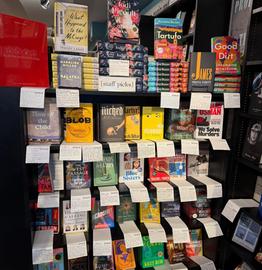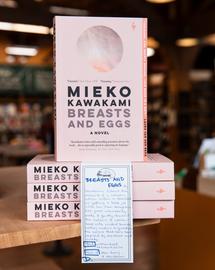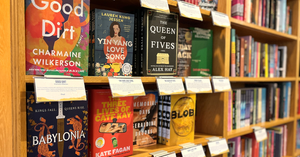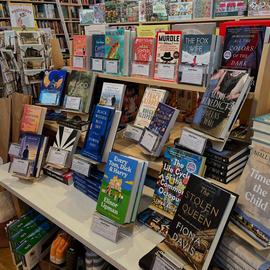Book blurbs are in the news again, thanks to a recent decision by Sean Manning, publisher of Simon & Schuster's flagship imprint, to no longer require authors to obtain blurbs for their books.
I've never been much of a blurb guy. They've always seemed more decorative than useful to me. Sometimes I read them; I've even written a few. But seldom do they have a significant influence on my decision to buy a book.

|
|
| At Pages: a Bookstore, Manhattan Beach, Calif. | |
Indie bookseller Staff Picks? Now that's a different story. Whether they appear on shelf-talkers or sales floor displays, social media videos or Indie Next Picks, I do care what booksellers have to say.
So, after the S&S blurb news broke, I took a beat before deciding to write anything about it. The change wouldn't really affect me as a reader. And did I need to add to the flurry of media and social media reaction that followed the announcement? Was the decision going to radically change what Slate called the blurb-industrial complex?
The news coverage has had legs, though, and the topic is being approached from many angles by journalists, including the New York Times ("The End of the Blurb. Thank God."), the Wall Street Journal ("The Best Column About Blurbs You'll Ever Read"), Vox ("A major book publisher announced a change. The industry freaked out"), and Smithsonian magazine ("Are 'Gripping,' 'Brilliant' Book Blurbs on Their Way Out?"), to name just a few.

|
|
| At Elliott Bay Company, Seattle, Wash. | |
Eli Wizevich wrote in Smithsonian that "blurbing often falls short of these ideals. Sometimes, blurb writers don't read the entire book before heaping praise on an author's latest effort. For some readers, such accolades read as insincere or overwrought. It doesn't help that blurbs frequently repeat bromides like 'spellbinding,' riveting,' and 'a tour de force' until they've lost meaning."
In the Sydney Morning Herald, David Astle noted that he has "done a few logrolls in my time, just as I've cadged the deflected limelight of writers higher in the food chain. It's a karma model. Big fish traditionally look after little fish since the biosphere may invert come the next monsoon, seeing you scrounging any endorsement you can find."
A couple of years ago, I wrote a blurb-themed column headlined "The Captivating, Unputdownable, Highly Recommended Book Blurb," in which I noted my own suspicions about blurbs: "I don't think of myself as a conspiracy theorist, but (the inevitable 'but' of conspiracy theorists) I've been in the business long enough to recognize the six (or fewer) degrees of separation between authors and some of their blurbers."
That column was a response to a dustup about extracting positive blurbs from negative reviews, specifically regarding the U.K. edition of a Jordan Peterson book that had spliced negative quotes from reviewers to suggest positive endorsements for the book.

|
|
| At Parnassus Books, Nashville, Tenn. | |
For someone who doesn't care about them, I seem to have written about blurbs more than I thought I had. A year before that 2023 column, I'd opened one ("Herding a Stack of Book Blurbs") with an epigraph: "From the moment I picked up your book until I put it down I was convulsed with laughter. Someday I intend to read it." That was Groucho Marx's classic blurb for Dawn Ginsbergh's Revenge by S.J. Perelman in 1929.
So, if blurbs don't matter to me and I have suspicions about their effectiveness, then why am I slightly obsessed with them in concept? Maybe because I know that what I consider to be the purest form of the blurb--bookseller Staff Picks--really does sell books.
 |
|
| At Book Love, Plymouth, Mass. | |
"I read a book and liked it. You might like it, too." While enthusiastic, person-to-person handselling is a fun superpower for indie booksellers to wield, it can also be a captive of its own mythology. Not every bookseller is a natural handselling conversationalist or #BookTok video star. Fortunately, any bookseller can be a Staff Picks superhero.
When I was first hired as a bookseller in ancient times, the prospect of handselling was a little scary, but the best training wheels were shelf-talkers. I quickly discovered the power of a few well-chosen words. People started buying the books I recommended. Some of them sought me out for more suggestions. Bookish conversations developed that would carry on for years.
The Internet gradually upped the ante, with Staff Picks pages escaping the confines of the sales floor. Sometimes tourists would introduce themselves to me years after they'd begun reading my staff picks online. It was like discovering an old friend you'd never met before.
Wrestling with the eternal bookseller's dilemma of how to summarize a book in two sentences on a shelf-talker encouraged both sharp writing and, strangely enough, improved my conversational handselling technique.
Maybe I couldn't sell anything else, but I could sell books. And what was the secret? Something I'd known all along as a reader and writer, but hadn't realized was also a bookseller's superpower: trusting the quiet potency of the written word.
There are a lot of superb handsellers out here. They can turn a book that might sell three copies into a book that will sell 30, 130, or 300 for no better reason than that they love an author's work. Booksellers can create captivating, funny, intriguing, incisive, clever blurbs that make books... unputdownable. Staff picks are the best blurbs.

